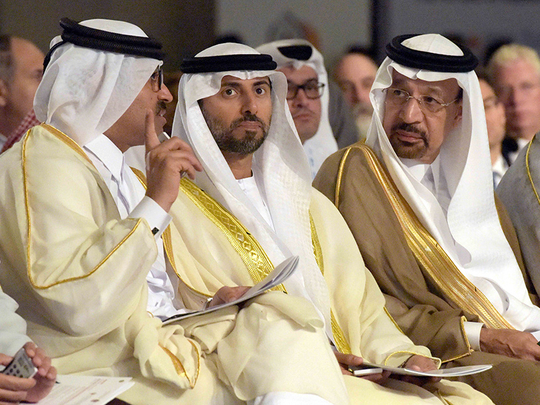
Abu Dhabi: Some countries within the Opec (Organisation of Petroleum Exporting Countries) have reached a preliminary agreement to extend the deal to cut oil production beyond six months to rebalance the oil markets, energy ministers from Gulf states said in Abu Dhabi on Thursday.
International oil benchmark Brent crude rose as much 1.17 per cent before trading at $52.99 per barrel at 5.21pm UAE time on Thursday following statements from Gulf oil ministers. Oil prices had jumped 16 per cent on the back of a deal late last year to cut output, the first deal for 15 years seen as game-changer by analysts.
“There is a preliminary agreement but we haven’t communicated to any countries. Consensus is building for the extension of the deal,” Khalid Al Falih, Saudi Arabia’s energy minister, told reporters on the sidelines of a conference in Abu Dhabi.
He said there has been a high level of commitment in the past three months but they haven’t achieved the goal of reaching the five year average of oil inventories. “If oil stocks remain too high, we will extend this agreement to nine or even 12 months.”
Echoing similar views, Kuwait oil minister Essam Al Marzouq said that extension of the deal is necessary for oil markets to rebalance. “We see a preliminary agreement but we have to confirm it from other countries. All twenty four countries including Russia are in favour of extension of the agreement.”
Quizzed on whether Libya, Nigeria or Iran will be asked to cut production if the agreement is extended, he said there won’t be any big production coming out of these countries in near future. “We don’t see big production in Libya or Nigeria. Iran has affirmed their consensus for the extension of the agreement and has agreed to freeze production at 3.8 million barrels per day.”
Compliance
He said compliance from Russia has been good and has risen from 120,000 barrels per day in January to 230,000 bpd currently. “Compliance from non-Opec countries has also gone up from 40 per cent in January to 60 per cent in February and 80 per cent in March.”
Oman oil minister Mohammad Al Rumhy also hinted about the extension of the deal and said the number of countries supporting the extension would be high.
Thirteen members of the Opec and 11 non-Opec members agreed to cut production by about 1.8 million barrels a day to prop up oil prices in December last year.
Opec agreed to slash output by 1.2 million barrels a day and non-Opec members led by Russia promised to cut 558,000 barrels a day.
Libya and Nigeria have been exempted from the deal as their production is affected due to internal conflicts and Iran has been allowed to increase production to pre sanction levels of about four million barrels a day.
Oil producing countries will meet in Vienna at the end of May to decide whether or not to extend the deal.












